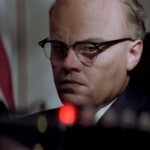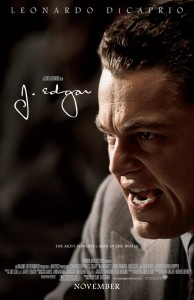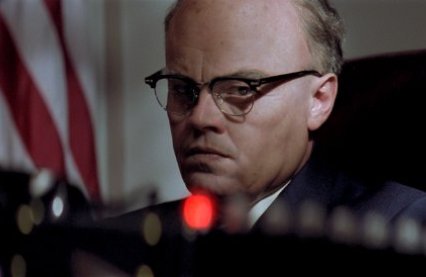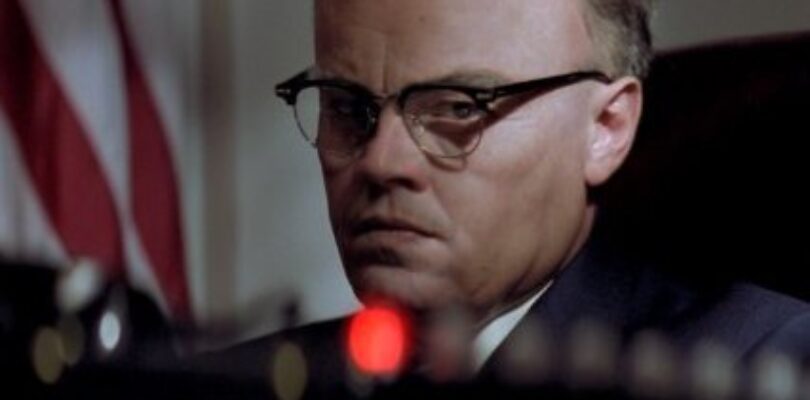
| Release Date: | November 11th, 2011 |
| Starring: | Leonardo DiCaprio, Armie Hammer, Naomi Watts, Josh Lucas, Judi Dench, Ed Westwick |
| Writer: | Dustin Lance Black |
| MPAA Rating: | R |
| Director: | Clint Eastwood |
Clint Eastwood’s biopic of the innovative, paranoid lawman who became as notorious as the criminals he hunted as the first Director of the Federal Bureau of Investigation, J. Edgar is a modest chamber drama that doesn’t offer its audience many of the comforts of the usual Hollywood historical epics – Eastwood’s whispering piano score and a monochromatic look that almost appears black-and-white in many scenes are evidence that he is not interested in exaggeration. J. Edgar may strike many as a somber slog when confronted with its deeply flawed characters, measured pacing, and stoic emotional moments – the first scene gives false hope for excess-junkies when it opens with a bomb blast, but most of the picture is a weary overview of Hoover’s influence on modern methods of law enforcement, his intimidating later presence in politics, and a private relationship with one Clyde Tolson.

Writer Dustin Lance Black, fresh from an Oscar win for the Milk screenplay, has a knack for episodically touching on key historical events like the trial and execution of leftist radical Emma Goldman, the rash of marquee-ready gangsters during the Prohibition era, and the JFK assassination, but reserves a large chunk of the running time to the most famous crime of its day – the “Lindbergh baby” kidnapping.
Black’s script gives most of its emotional heft to the fragile homosexual bond between Hoover and his lifetime companion Clyde Tolson (Armie Hammer first seen as an alien-looking silhouette outside Hoover’s office). The greatest hurdle this movie faces is being mistaken for camp by those unfamiliar with Hoover’s leanings (especially his penchant for cross-dressing) and unprepared for the tender and volatile love between the two men. Since his secret life was made public by biographers, J. Edgar Hoover has become a punch line in a dress; now is a good time to set that aside and appreciate the subject for his private torment brought on by a domineering mother (Judi Dench) and the long-term consequences of his ego-damaged control of a government agency.

Leonardo DiCaprio in J. Edgar. Photo by Courtesy of Warner Bros.
© 2011 Warner Bros. Entertainment Inc. – All Rights Reserved.
Maybe the borderline kitsch of some scenes is down to Eastwood’s unsure handling of the homosexual subtext. He finds more confident artistic ground in the Lindbergh storyline – just take a look at the lineage of children-in-peril at the center of Mystic River, Changeling, and A Perfect World. The movie switches genres a few times (gangster yarn, domestic drama, historical Cliff Notes) but nowhere does Eastwood excel more than in the grim account of the Lindbergh case.
Make no mistake though, the events of history serve only as background to the unrequited attraction of Tolson and Hoover in closeted America that, given the proper empathy, turns out to be one of the saddest, truest love stories of the year. J. Edgar feels unbalanced at times (the later Kennedy and Nixon years feel rushed), but the overall effect is the humanizing of an often-times reprehensible public figure without slipping into gossip or aggrandizement with a mature, interior performance from Mr. DiCaprio.[box_info]WHERE TO WATCH (powered by JustWatch)
[/box_info]

